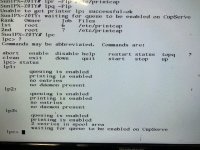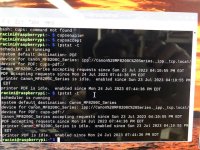RichCini
Veteran Member
All --
I'm making progress getting my IPX configured -- this weekend I was working on getting network printers to work, but not having much success yet. Here's what I've done so far, so maybe someone can tell me where I've gone sideway with it.
I have a Canon IP-enabled printer that can print using LPD on port 515 (which I think is standard). Everything is on the same subnet, and I can ping the printer @ 192.168.1.65 (fixed IP) from SunOS. I've done the following:
So, I think I'm pretty close to get this working, but I'm wondering where I've gone wrong with it.
Any input would be appreciated.
Rich
I'm making progress getting my IPX configured -- this weekend I was working on getting network printers to work, but not having much success yet. Here's what I've done so far, so maybe someone can tell me where I've gone sideway with it.
I have a Canon IP-enabled printer that can print using LPD on port 515 (which I think is standard). Everything is on the same subnet, and I can ping the printer @ 192.168.1.65 (fixed IP) from SunOS. I've done the following:
- Edited /etc/hosts to add an entry "192.168.1.65 CanonLPD"
- Added an entry in /etc/printcap for the printer: np|Network Printer:|np|Network Printer:\:rm=CanonLPD:\
:sd=/var/spool/lpd/npd:\
:lf=/usr/adm/lpd-errs:\
 \
\
w#0:\
:mx#0: - Fiddled with the folder /var/spool/lpd/npd. "chown root npd", "chgrp daemon npd", and "chmod 755 npd"
- I've used "lpr -Pnpd {filename}" to print a file.
So, I think I'm pretty close to get this working, but I'm wondering where I've gone wrong with it.
Any input would be appreciated.
Rich


